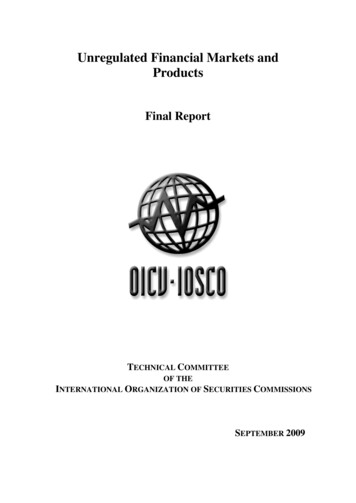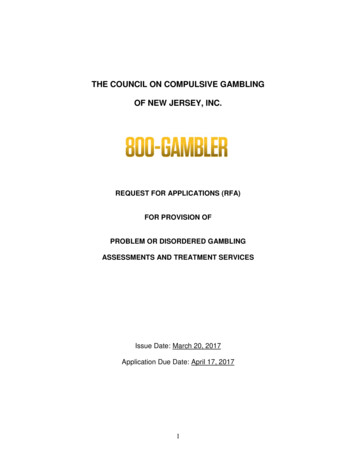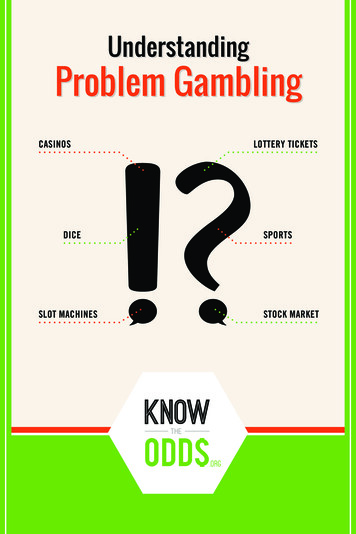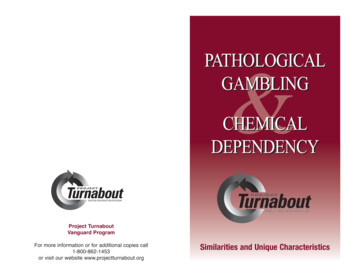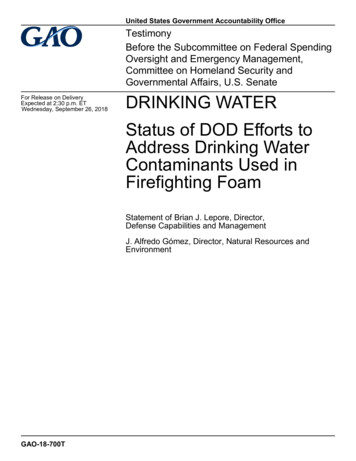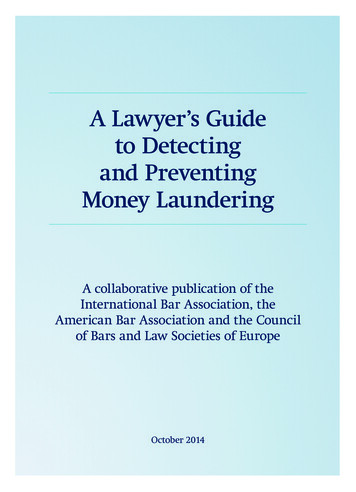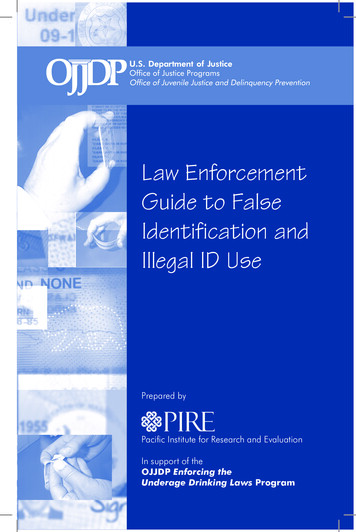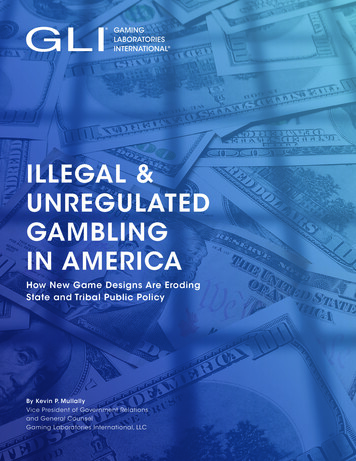
Transcription
ILLEGAL &UNREGULATEDGAMBLINGIN AMERICAHow New Game Designs Are ErodingState and Tribal Public PolicyBy Kevin P. MullallyVice President of Government Relationsand General CounselGaming Laboratories International, LLC
TABLE OFCONTENTSGambling Expansion Without RulesExecutive Summary0303BackgroundThe DilemmaPolicy Erosion040404Eroding State & Tribal Public PolicyState & Tribal Policy ObjectivesEmerging Forms of Illegal GamblingThe Endless Litigation Repeat LoopThe Arcade/Video Game Parlor Dilemma0910111215The Solution: Protecting Public Policy ObjectivesReinforcing the Presumption thatUnregulated Gambling Is IllegalA Regulatory Framework to OverseeModern Gaming Technology1617Conclusion2017
GAMBLINGEXPANSIONWITHOUTRULESEXECUTIVE SUMMARYEvery state in the union makes gambling acrime. Enacting exceptions to that rule isdifficult and taken with great care. Regulatorystructures are well-crafted and well-funded,designed to prevent criminal activity,ensure transparency in the legal gamblingoperations, dedicate funds from gambling toworthy causes, and to create protections forthe vulnerable.Illegal gambling in the United States hasexpanded to the point that it might beconsidered a rampant issue with violatorsbeing reported regularly across the country.Violent and other types of crime tend to bepresent around illegal gaming establishments.The rising occurrence of unregulated andillegal gambling operations is weakeningstate policy objectives. This phenomenon isbeing fueled by increasingly sophisticatedtechnology designed to take advantageof archaic, often vague, criminal gamblingstatutes that never envisioned moderngame designs. This allows for the creationof devices that present themselves asslot machines while allowing operators toargue the machines escape the definitionof illegal gambling. They operate withoutany supervision and do not adhere to anyreviewable set of operational guidelinesdesigned to prevent fraud, theft, moneylaundering and a variety of other criminalbehaviors. There are no protections forconsumers and no protection for problemgambling.There is a desire among policymakers todistinguish between what they perceiveto be harmless family entertainmentgames found in high-end, multipurposeentertainment centers/arcades, and stripmall slot parlors/mini-casinos most viewas problematic. Frequently, policymakersand regulators seek to create an exceptionfor “skill-based amusement devices” or“amusement games” to resolve this dilemma.The problem is that technology always wins.Because of the inherent conflict in thesetwo goals, developers can circumvent thedefinition of an illegal gambling device bycreating “something that isn’t that”. Statesare losing revenue, economic developmentopportunities and financial support forimportant causes, and individuals are placedat increased risk. Litigation has proven to bea costly and repetitive attempt at damagecontrol that is failing.Our studied view is that the only effectiveway to protect the fidelity of a jurisdiction’spurposeful gambling policy is to requireregulatory review of every type of gamblingdevice. A suggested regulatory framework,adjustable to the spectrum of jurisdictions, iscontained herein.3
BACKGROUND“This is a game room that steals from people on fixed incomes.There’s crime that happens in and around these places.”Constable Alan Rosen, South Houston, TexasThe DilemmaUsing a wide variety of technology and gametypes, purveyors of unregulated and illegalgambling are multiplying more rapidly acrossthe U.S. These operations often lead to a widevariety of social ills including fraud, moneylaundering, violent crime, drug trafficking, andpreying on problem gamblers.POLICY EROSIONUnregulated and illegal gambling operationserode state gambling policy by siphoningtax dollars away from worthy causes, preyingupon the vulnerable and facilitating a widearray of criminal activity. Moreover, theycircumvent the purposeful gambling policygoals set by the states and sovereign tribalgovernments.Illegal gambling in the United States isexpanding so rapidly that it is now anationwide problem. Consider just a few ofthe troubling cases recently reported acrossthe country: 4Since January 2018, the Kern County,California Sheriff’s Office (KCSO) hasraided over 100 establishments with illegalvideo gambling machines. KCSO reportsthat each game can gross between 50,000 and 100,000 per month. 1Theillegal gambling parlors have resultedin a tenfold increase in crime and theoperators prey on the addicted and thevulnerable. 2 In South Houston, Texas, police raidedan illegal gambling hall with over 200gambling devices that were grossingbetween 60,000 and 100,000 per day. 3After seizing piles of cash, Constable AlanRosen commented, “This is a game roomthat steals from people on fixed incomes.There’s crime that happens in and aroundthese places.”1Kotowski, Jason (2019, March 29) KCSO has busted roughly 100 illegal video gambling parlors in past 14 months. The Record. https://www.bakersfield.com2Ibid.3White, Dawson (2019, June 25) Sparks fly as Houston officers find stacks of cash in raid of illegal gambling room. The Kansas City Star. www.kansascity.com4Consillio, Kristen (2020, January 15) Man convicted of manslaughter in Honolulu game room shooting. Honolulu Star Adviser. www.staradvertiser.com5Nirappil, Fenit (2020, January 27) Games that offer cash rewards are flooding the region. Is it illegal gambling? The Washington Post. www.washingtonpost.com
A Honolulu man was recently convicted ofkilling a patron at Gameroom Rock Za Suraas part of a botched robbery attempt. 4 In the District of Columbia and Virginia,thousands of games that operatorsallege to rely on skill have flooded intobars, convenience stores and restaurants,causing widespread alarm among stateand local public officials. “You are notwinning 150 playing Pac-Man,” said FredMoosally, the director of the D.C. AlcoholicBeverage Regulation Administration, whichproposed new restrictions. “What we don’twant is to have illegal games that areunregulated that are actually gamblingdevices in the District of Columbia.” 5 While four local governments in Virginiahave taken steps to try to eradicatethe growing number of “skill gamblingmachines,” the devices continue to spreadrapidly throughout the state. The VirginiaLottery estimates that it will lose 140million over the next year as a result ofthe growing number of these gamblingdevices. “It’s keeping me awake at night,”said Virginia Lottery executive director,Kevin Hall. “It is not right; they are allowedto operate without any oversight, anyregulation, any rules of the road, with notax benefits to the locality or to the state?” 6 6Missouri Lottery commissioner, Paul Kinkaid,estimates that almost 14,000 machinesmay be in operation throughout Missouri. 8 In California, police have shut down atleast eight illegal gambling halls since2019. Long Beach Police Chief Robert Lunastated that “. . . what we are seeing aroundthese locations are people carryingguns.” 9 LBPD Lt. Aaron Alu observed that“these places can make a lot of money,”and are hives for gangs and organizedcrime. In the past six months, two peoplehave died and two have been wounded inthree different shootings associated withthe gambling houses. 10 In North Carolina, law enforcement officialsseized 93 illegal gambling machines andover 12,000 in a raid of “sweepstakesparlor” that was operating as a minicasino. GLI served as the expert witness forthe Alamance County Prosecutor whichresulted in a guilty plea, destruction of thedevices and surrendering of the cash tothe local school district. In Hawaii, federal agents raided twoillegal gambling houses in Waipahu andPearl City, seizing 60 illegal gamblingmachines and about 150,000 in cash.The U.S. Department of Justice issuedfederal indictments against 15 peoplefor crimes that included illegal gambling,possession of controlled substances withthe intent to distribute and possession offirearms in furtherance of drug trafficking,robbery and arson. GLI served as theexpert witness for the DOJ for the illegalgambling charges resulting in convictionsin federal court. 11The problem has become so bad inMissouri that the House of Representativesestablished an Interim Committee to studythis issue in the second half of 2019. Duringa hearing, the Missouri State HighwayPatrol testified that complaints aboutillegal gambling have increased from 39in 2018 to 145 through September 2019. 7A bad bet? ‘Skill machines’ could cost the Virginia Lottery and local schools millions. (2019, December 9) retrieved -and-local-schools-millions/7Missouri General Assembly, House of Representatives (2019). Report of the House of Representatives Special Interim Committee on Gaming. p. 9.8Id. At 8.9Osier, Valerie. (2020, January 26). What’s a slaphouse? Police say they’re fighting new wave of illegal gambling. Long Beach Post. www.lbpost.com10Id.11CS-00-UHI-19-01 (Honolulu PD and HSI Joint Op - 2019) Case Number: CR 19-00119 JMS5
12When an illegal gambling housecontaining “eight-liners” became a seriousproblem in Fort Worth, Texas, the citycouncil enacted an ordinance prohibitingthem. The gambling operators sued, andthe case is currently pending before theSupreme Court. The gambling operatorsargue that the machines fit under anexemption for machines that pay outsmall, non-cash prizes, like machinesfound in arcades. The attorney for the cityhas argued that “the prizes aren’t fuzzyanimals. They’re X-boxes. They’re flat screenTVs.” 12On January 24, 2020, the Waco PoliceDepartment’s SWAT team raided anillegal gambling house containing 24 slotmachines. Charges are pending. 13In Oakland, California, a 22-year-old manwas recently convicted of fatally shootinga man outside of an illegal gambling club.In April 2019, a man was shot and anotherpistol-whipped during a robbery at thesame illegal gambling parlor. Indicativeof the lack of law enforcement resourcesavailable to respond to this growingproblem, the defense attorney in the case,a former local prosecutor, commented, “Inmy 26 years of experience in the criminaljustice system, I’ve never known it to be apriority to crack down on illegal gamblingclubs in Oakland.” 14In Michigan, the Gaming Control Boardhas worked with the Attorney General’sOffice and local law enforcement toaggressively pursue enforcement actionsagainst illegal gambling operations.This strategy has seen great success.MGCB Executive Director Rick Kalmprovided an overview of this effort asfollows: 96 locations have been investigatedto date27 locations were closed via searchwarrants by the Attorney General’s office orlocal police41 Cease and Desist letters were servedon owners and locations resulting in theclosure of another 26 locations45 additional locations closed forunknown reasons or moved locations todifferent addresses981 machines seizedMore than 172,000 in cash forfeited tolocal law enforcement36 individuals faced 146 charges105 Felonies41 Misdemeanors While the Michigan experience is to beapplauded, it is also an outlier. Otherstates, such as Texas and Florida, thathave had temporary success using anenforcement strategy have found theeffort to be difficult to maintain over theyears, with temporary eradication of illegalgambling operations, only to see themreemerge after a period of hibernation. In Between January 22 and February25, 2020, Pennsylvania state policeand liquor control agents raided 17locations housing what they allege areillegal gambling devices, seizing 71machines and more than 115,000 incash. “Illegal, unregulated gambling isa serious and growing problem facingthe Commonwealth,” said Captain JeffreyWeinberg, Tessa. (2020, January 28). Fort Worth asks Texas Supreme Court to declare eight-liner machines illegal lotteries. Forth Worth n, Jerry. (2020, January 24). Waco Tribune-Herald. www.wacotrib.com14KPIX TV. Man Gets 8-Year Prison Term In Shooting Death Outside Oakland Illegal Gambling Club. Retrieved ing-club/156Kellar, Travis. (2020, February, 28). ‘Skill-based,’ other gambling devices seized statewide: state police. https://www.pennlive.com.
When states chose to allow exceptions tothe general rule that gambling is illegal, theycrafted extensive and well-funded regulatorystructures to control it. These systems preventcriminal activity, ensure transparency in thelegal gambling operations, dedicate fundsfrom the gaming operation to worthy causes,and create protections for the vulnerable.These important safeguards are missingfrom illegal gambling operations, so it isnot surprising that it attracts gang activity,organized crime, drugs, violent crime, andpreys upon the vulnerable and the addicted.A typical unregulated “skill” gambling parlor in Pennsylvania.Rineer, acting director the PennsylvaniaState Police Bureau of Liquor ControlEnforcement. He noted that “So far in 2020,gambling machine seizures have beenreported from every BLCE office, in countiesfrom Erie to Philadelphia.” 15These examples are just a small samplingof the rapidly expanding illegal gamblingmarket that is eroding state gamblingpolicy and leaving a trail of devastatingsocial harms that is the certain result ofunregulated gambling. There is a reasonwhy every state in the union makesgambling a crime. There are also reasonswhy it is difficult to enact exceptions tothat rule.This GLI Policy Series White Paper will examinethe key state policy goals that are beingcompromised by the rapid expansion ofillegal gambling devices and offer a solutionto eradicate existing operations.Unregulated and illegalgaming venues operatewithout any supervision. Theydo not adhere to prescribedoperational guidelinesdesigned to prevent fraud,theft, money laundering, anda variety of other criminalbehaviors.7
These importantsafeguards are missingfrom illegal gamblingoperations, so it isnot surprising that itattracts gang activity,organized crime, drugs,violent crime, and preysupon the vulnerableand the addicted.
ERODINGSTATE &TRIBAL PUBLICPOLICYNearly every state in the union has a criminalprohibition against gambling. These laws wereenacted as part of what Professor I. NelsonRose calls the end of the second wave ofunregulated and illegal gambling operationsis eroding these state policy objectives.legalized gambling in the U.S. 16impact unregulated and illegal gamblingoperations are having on the enormouslysuccessful implementation of tribal gamingpolicy. Since the landmark Californiav. Cabazon Band of Mission Indians 18decision was handed down in 1987 and thesubsequent enactment of the Indian GamingRegulatory Act (IGRA) in 1988, gamblinghas provided invaluable resources to tribesthroughout the country to improve the safety,economic security, and quality of life in tribalcommunities.Beginning with Nevada in 1936, many stateshave created exceptions to this generalprohibition, with each state having specificpublic policy objectives for the gamblingactivities they have chosen to legalize. In his1986 book, Gambling and the law, ProfessorRose observes, “Thirty-five years ago, gamblingfor money was illegal, period. It did not matterif it was a nickel-ante game of poker played ina neighbor’s den or a friendly bet on Mondaynight football with a co-worker over a beer.”Since, Rose penned this in 1986, nearly everystate has authorized some form of gambling.However, they have done it with strict controlsand for specific policy reasons.” Rose goes onto comment, “It is difficult to think of anotherarea of the law where 50 individual stateshave changed their thinking 180 degreeswithin such a short time.” 17 And yet, despitethe clear articulation of policy by the states– that gambling is illegal except whenauthorized to fulfill specific and purposefulpolicy objectives – the rising occurrence ofThe problem is further exacerbated by theThe unregulated and illegal gamblingmovement threatens this progress. Thisphenomenon is fueled by increasinglysophisticated technology designed to takeadvantage of archaic, often vague, criminalgambling statutes that never envisionedmodern game designs. These statutes allowfor the creation of devices that presentthemselves as slot machines while allowingoperators to argue that the design escapesthe definition of illegal gambling.16Rose, I. Nelson. (2010). Gambling and the Law: The Third Wave of Legal Gambling, 17 Jeffrey S. Moorad Sports L.J. 36117Rose, I. Nelson (1986). Gambling and the law. Gambling Times.18480 U.S. 202 (1987)9
Despite the clear articulationof policy by federal, stateand tribal law – thatgambling is illegal exceptwhen authorized to fulfillspecific and purposefulpolicy objectives – the risingoccurrence of unregulatedand illegal gamblingoperations is underminingthese important policy goals.STATE & TRIBALPOLICY OBJECTIVESWhen Missouri legalized riverboat gamblingin 1993, its goal was to encourage “economicdevelopment, job creation and the promotionof Missouri as a major tourist attraction.” 19The funds for gaming were to be devotedto specific causes, with all the tax revenuefrom gambling dedicated to education. Inaddition, the casinos would pay a fee foreach admission, which would support thelocal government where the casino wasbased; the cost of regulation; and importantcauses such as funding for nursing homesfor veterans, early childhood educationprograms, and law enforcement programs toreduce gang violence. 20Upon passage of the legislation, the MissouriRiverboat Gaming Association (MRGA)predicted that the next two years wouldproduce six licensed casinos generating 5,400new jobs and 78 million in tax revenue foreducation. 21 The actual results would shatter10the MRGA’s estimate, as Missouri GamingCommission would license seven casinos inits first two years, employing 8,234 peopleand depositing 96.7 million into the state’seducation fund.Missouri’s first-generation casino projectswould inject nearly 675 million of capitalinvestment into the Missouri economy andcontribute an additional 45.1 million ingaming fees dedicated to local governmentsand special causes. 22 Since that time, it hasbecome clear that Missouri’s policy goalshave been fulfilled. From 1994-2018, theMissouri casino industry has produced: 6.93 billion for educational programs(elementary, secondary and earlychildhood) 3.2 billion in capital investments inMissouri 927.5 million to all causes supported byadmission fees including 324.2 million forveterans programs 23This phenomenon is fueledby increasingly sophisticatedtechnology designed to takeadvantage of archaic, oftenvague, criminal gamblingstatutes that never envisionedmodern game designs.This allows for the creationof devices that presentthemselves as slot machineswhile allowing operatorsto argue that the designescapes the definition ofillegal gambling.19Missouri Gaming Commission 1994 Annual Report, page 3.20Mo. Rev. Stat. § 313.822 (A.L. 1993 S.B. 10 & 11 § 10).21Missouri Riverboat Gaming Association. (1993, April 30). Missouri Riverboat Gaming Association Supports State Riverboat Gaming Legislation.22Missouri Gaming Commission 1994 Annual Report. Pages 51-59.23Missouri Gaming Association Annual Report (2018).
It is important to understand that Missouri’sConstitution limits the number of casinos to13, reflecting the state’s limited tolerance forgambling and its policy decision to focuson reinvestment in quality properties, ratherthan having a free-market approach togambling policy. It is clear that having asmany as 14,000 unregulated, illegal devicesspread throughout the state is underminingthis constitutional policy decision that wasenacted by Missouri’s citizens.Similarly, Pennsylvania created thePennsylvania Gaming Control Board (PGCB)in 2004, giving it the authority to license 14casinos with the objective of invigorating theeconomy, creating jobs, preserving the state’shorse racing industry, and providing propertytax relief for homeowners. Since the industry’sinception in 2006, it has produced 17 billionin tax revenues for the commonwealth,while creating 16,000 direct casino jobs. 24As in Missouri, and a majority of the otherstates, the rampant growth of unregulatedand illegal gambling is rendering carefullycrafted state and tribal gambling policiesmeaningless.The positive results of tribal gaming policyhave been even more impressive. Since 1985,the National Indian Gaming Association(NIGA) has worked to promote tribal gamingpolicy objectives that include “protecting andpreserving tribal sovereignty and the abilityof tribes to attain economic self-sufficiencythrough gaming and other forms of economicdevelopment.” 25 Its mission has been aresounding success. In 2018, 501 NativeAmerican casinos produced 33.7 billion ingross gaming revenue while creating 676,428jobs. 26 In 2019, the estimated economicimpact of tribal gaming was 105.42 billion.The rampant growth ofunregulated and illegalgambling is renderingcarefully crafted state andtribal gambling policiesmeaningless.EMERGING FORMS OFILLEGAL GAMBLINGMany forms of unregulated and illegalgambling devices that we are seeing todayare using more advanced technology todisguise them as “skill games” or “arcadegames.” The random number generator (RNG)is often shielded by game features offeringthe player a choice of whether to cash outor continue. This is commonly referred to asa “pre-reveal” feature, where, after the playersees the outcome of a game, they are giventhe opportunity to cash out or continueplaying. Other games give a player the optionof playing some game of skill to avoid a lossor they can accept the loss and continueplaying the device like a traditional slotmachine. Of course, few, if any, players usethese features because it makes playing thegame tedious and lacks entertainment value.To understand how technology is being usedto camouflage gambling devices, considerhow a manufacturer in Virginia, who hasplaced approximately 5,000 of the devices,describes its technology as reported in TheVirginia Mercury:“. . . the company insists that it’s theonly one in the state that’s operatinglegally because its proprietary softwarealso includes a secondary game that,in theory, allows a player to win a few24Pennsylvania Gaming Control Board Annual Report 2018-19. Page 5.25National Indian Gaming Association. http://www.indiangaming.org/about26National Indian Gaming Commission. 2018 Gross Gaming Revenue Reports. orts27Oliver, Ned. (2019, October 30). A slot machine showdown in Chesterfield parking lot highlights legal uncertainty. The Virginia Mercury.https://www.virginiamercury.com11
cents on every spin if they take the timeto complete it and have the mentalwherewithal to remember a Simon Saysstyle 20-beat pattern. Users can easilyskip over it in favor of a faster-paced, slotmachine style of play, but the companysays its existence means that a playercan win on every try based on skillalone.” 27The policy debate in Virginia has createdan odd conflict between operators ofthese devices, leaving them to engage inbizarre, pro wrestling style, publicity battlesover whose devices are more illegal. 28Meanwhile, the Commonwealth’s attorneyin Charlottesville ruled that the machineswere illegal. The operators responded byfiling a lawsuit to overturn the decision. Asthe litigation proceeds, the Legislature isconsidering several bills to clarify that themachines are illegal gambling devices.Moreover, the Legislature spent last yearpreparing a report to assist in developing acomprehensive gambling policy. 29 The reportcontained specific findings regarding theimpact of the growing number of unregulatedgambling devices in the state:Proliferation of unregulated electronicgaming devices, or “grey machines”around the state, could pose directcompetition to Virginia’s authorizedgaming such as lottery, charitablegaming, and historical horse racing, aswell as any additional forms of gamingthat could be authorized in the future.These unregulated grey machines createrisks for players and businesses. Virginiacurrently uses a local approach toenforce the legality of the devices, whichhas led to inconsistent and insufficientoversight. Other states have addressedgrey machines, through regulation or anoutright ban on the devices. 3012The experience in Virginia is common inthe United States. Nearly every jurisdictionattempting to combat the devices by usingthe obsolete definition of gambling device inits criminal code has either been overruled,presented with additional guidance furthercomplicating enforcement or has beenfrustrated by cycles of expensive litigationthat wastes resources and does not produceconclusive results.Photo courtesy of Penn National Gaming from Special Report by SpectrumGaming. Used with permission.THE ENDLESS LITIGATION LOOPA common experience in many jurisdictions iswhat we will refer to as the endless litigationloop. Prosecutors and law enforcementofficials throughout the country will find thefollowing scenario familiar:1. Law enforcement begins to receivecomplaints about an unregulatedgambling operation that is involved in oneor more of the following:a. Openly offering games that functionsimilarly or identical to a typical casinoslot machine with citizens questioning theirlegality.b. Patrons complain they have beendeceived or the devices are “rigged.”28Ibid.29Regulatory Management Counselors, P.C. (2019). Comparative Governance and Regulatory Structures of Gaming Regulation Related to Expanded Legalized Gaming30Ibid.Activities in the Commonwealth of Virginia. Prepared for The Innovation Group as Part of Its Report to the Virginia Joint Legislative Audit and Review Commission.
Consumer complaints are not addressedby the operator.c. A consumer complains that they arebecoming dependent on the devices, ora relative or friend of a player complainsthat a player is addicted to the machinesor is spending too much time/moneygambling at the unregulated venue.d. The venue is a gathering place forgangs and persons with extensive criminalrecords. A variety of criminal behavior isbeing reported in or around the gamingfacility.e. There are reports of persons whoappear to be underage that are eitherunsupervised, playing the devices, oraccompanying persons who are playingthe devices.f. People who are intoxicated withalcohol or drugs are observed playing thedevices.g. Players are observed putting largeamounts of money into the machines,playing a very short time and thencashing out; then repeating the cycle(money laundering).2. Law enforcement investigates the locationand concludes there is reason to believethat it is an illegal gambling operation.3. Law enforcement contacts GLI andrequests an estimate for an initial forensicevaluation of machines.4. After signing a contract as an expert to bepaid by local taxpayers, GLI provides lawenforcement with a report describing thetechnology behind the machines and themethodology to achieve game outcome.5. Law enforcement works with localprosecutors to analyze the report anddetermine that the games violate thestate’s criminal statute prohibiting theoperation of gambling devices withouta license.6. The local prosecutor files a criminalcomplaint and seizes the machines.7. The gaming operator seeks a temporaryrestraining order (TRO) preventing theseizure, pending the outcome of thelitigation. The operators argue that thedevices contain some game logic,typically introducing some element ofskill, which allows them to fall outside thecriminal definition for a gambling device.8. The prosecutor enters into a contract withGLI to provide expert witness testimony inthe case, at further expense to the localgovernment.9. Months of discovery, depositions andpretrial motions consume more localresources at taxpayer expense.10. As the case nears trial, the gamblingoperator agrees to plea to a misdemeanorgambling charge and agrees not tooperate the machines that are the subjectof the litigation in the future.11. A few months after the settlement, a newcorporation, with a new version of gamingsoftware appears, claiming “it learned alot from the previous litigation” and nowhave a device containing even more skillthat does not run afoul of the criminalgambling statute.12. Repeat steps 1–11.13
Nearly every jurisdictionattempting to combat thedevices by using the obsoletedefinition of a gamblingdevice in its criminalcode has either beenoverruled, presented withadditional guidance furthercomplicating enforcement, orhas been frustrated by cyclesof expensive litigation thatwaste resources and does notproduce conclusive results.14
We have seen this cycle play out injurisdictions throughout the U.S. FromFlorida to California, from Ohio to Texas andPennsylvania to Hawaii. Litigation results,at best, are temporary victories and shortlycelebrated before the cycle starts again. It isexpensive. It is inefficient. It is contrary to thebedrock principle in every state authorizinglegal gambling: the industry is responsible forthe cost of its own regulation.It is regulation in reverse: First, operators flagrantly introduce gamesthat receive money, offer a short gameprimarily based on chance with minorelements of remedial skill; then make taxpayers foot the bill to showthat the operators are violating nearlyevery consumer protection and publicpolicy objective the jurisdiction hasestablished for gambling; and after the expensive exercise, the operatorsstart a new cycle of unregulated behaviorwith purportedly new technology or gamestrategy, forcing the taxpayers to start theprocess over again.The problem with this strategy is thattechnology will always win. Any exception wehave seen, no matter how artfully drafted, canbe circumvented by even more clever gamedesign that provides an actual or perceivedwork-aro
video gambling machines. KCSO reports that each game can gross between 50,000 and 100,000 per month.1The illegal gambling parlors have resulted in a tenfold increase in crime and the operators prey on the addicted and the vulnerable. 2 In South Houston, Texas, police raided an illegal gambling hall with over 200
